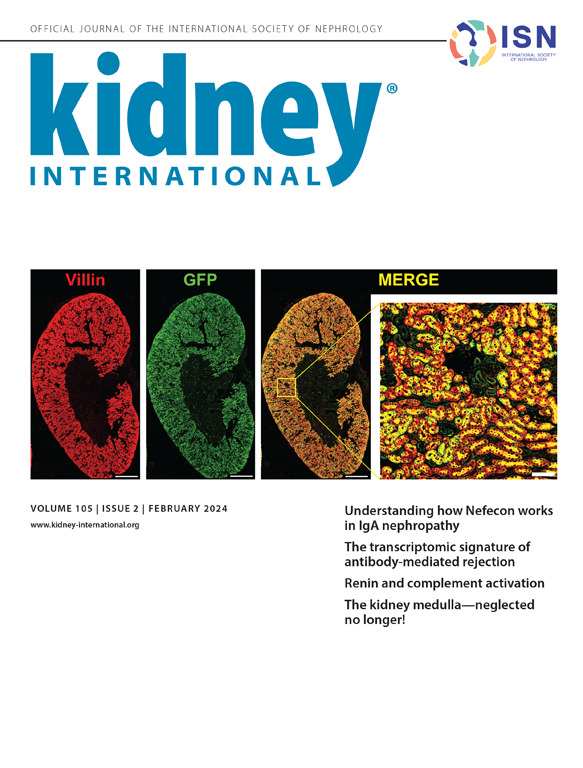通过转化生长因子-β信号传导,抑制肾近曲小管中的醛脱氢酶2有助于肾脏纤维化。
IF 14.8
1区 医学
Q1 UROLOGY & NEPHROLOGY
引用次数: 0
摘要
慢性肾脏病(CKD)是一种日益普遍的疾病,给全球健康和社会经济造成了巨大负担。与西方国家相比,中国、台湾、日本和韩国等东亚国家的肾衰竭发病率和患病率较高,而造成这种差异的原因尚不清楚。醛脱氢酶 2(ALDH2)是线粒体中外源性和内源性醛代谢的重要解毒酶。在 35-45% 的东亚人群中发现了 E504K 和 E487K 的失活突变,这种突变与包括心血管疾病和癌症在内的各种疾病的高风险有关。然而,人们对 ALDH2 在慢性肾脏病中的作用知之甚少。在这里,我们研究了 ALDH2 在正常和 CKD 人肾及小鼠肾脏中的表达模式,结果表明 ALDH2 的表达显著降低,其蛋白水平与 CKD 和纤维化程度成反比。此外,我们用马兜铃酸处理 ALDH2*2 基因敲入小鼠(一种 ALDH2 功能缺失模型),发现这些小鼠的纤维化程度加剧。此外,ALDH2 缺乏与体内和体外涉及上皮细胞分化过程的肾脏纤维化有关。然而,ALDH2过表达能保护近端肾小管上皮细胞免受转化生长因子-β诱导的体外去分化或部分上皮-间质转分化的影响。因此,我们的研究结果为涉及 ALDH2 的 CKD 的发生和发展提供了重要的临床信息,尤其是在东亚人群中。本文章由计算机程序翻译,如有差异,请以英文原文为准。

Suppression of aldehyde dehydrogenase 2 in kidney proximal tubules contributes to kidney fibrosis through Transforming Growth Factor-β signaling
Chronic kidney disease (CKD) is an increasingly prevalent disorder that poses a significant global health and socioeconomic burden. East Asian countries such as China, Taiwan, Japan, and South Korea have a higher incidence and prevalence of kidney failure when compared to Western nations, and the reasons for this discrepancy remain unclear. Aldehyde dehydrogenase 2 (ALDH2) is an essential detoxifying enzyme for exogenous and endogenous aldehyde metabolism in mitochondria. Inactivating mutations at E504K and E487K are found in 35-45% of East Asian populations and has been linked to a higher risk of various disorders, including cardiovascular diseases and cancer. However, little is known about the role of ALDH2 in CKD. Here, we characterized the expression pattern of ALDH2 in normal and CKD human and mouse kidneys and demonstrated that ALDH2 expression was significantly reduced, and that the protein level was inversely correlated with the degree of CKD and fibrosis. Further, we treated ALDH2∗2 knock-in mice, a loss of ALDH2 function model, with aristolochic acid and found that these mice showed enhanced fibrosis. Moreover, ALDH2 deficiency was associated with kidney fibrosis involving epithelial cell differentiation process in vivo and in vitro. However, ALDH2 overexpression protected proximal tubule epithelial cells from transforming growth factor-β-induced dedifferentiation or partial epithelial-mesenchymal transdifferentiation in vitro. Thus, our findings yield important clinical information regarding the development and progression of CKD involving ALDH2, especially among East Asian populations.
求助全文
通过发布文献求助,成功后即可免费获取论文全文。
去求助
来源期刊

Kidney international
医学-泌尿学与肾脏学
CiteScore
23.30
自引率
3.10%
发文量
490
审稿时长
3-6 weeks
期刊介绍:
Kidney International (KI), the official journal of the International Society of Nephrology, is led by Dr. Pierre Ronco (Paris, France) and stands as one of nephrology's most cited and esteemed publications worldwide.
KI provides exceptional benefits for both readers and authors, featuring highly cited original articles, focused reviews, cutting-edge imaging techniques, and lively discussions on controversial topics.
The journal is dedicated to kidney research, serving researchers, clinical investigators, and practicing nephrologists.
 求助内容:
求助内容: 应助结果提醒方式:
应助结果提醒方式:


